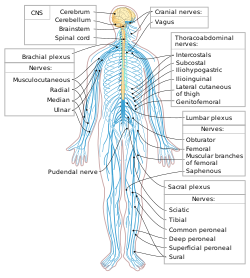Central nervous system disease

Editor-In-Chief: Prab R Tumpati, MD
Obesity, Sleep & Internal medicine
Founder, WikiMD Wellnesspedia &
W8MD's medical weight loss NYC, sleep center NYC
Philadelphia medical weight loss and Philadelphia sleep clinics
Introduction[edit]

Central Nervous System Diseases, also referred to as Central Nervous System Disorders, are a group of Neurological Disorders that profoundly impact the structure or function of the brain and the spinal cord. These two vital components collectively form the central nervous system (CNS).
Understanding the Central Nervous System[edit]
Before delving into CNS diseases, it's essential to understand the central nervous system itself:
Structure of the CNS[edit]
The central nervous system comprises two main parts:

- The Brain: The brain is the control center of the body, responsible for complex functions, including cognition, emotion, sensation, and motor control.
- The Spinal Cord: The spinal cord serves as a communication highway between the brain and the rest of the body. It plays a critical role in transmitting signals and reflex actions.
Function of the CNS[edit]
The CNS regulates various bodily functions, including:
- Sensory perception
- Movement and coordination
- Memory and learning
- Emotion and behavior
- Autonomic functions like breathing and heart rate
Types of Central Nervous System Diseases[edit]
Central Nervous System Diseases encompass a wide range of disorders, including but not limited to:
Neurodegenerative Diseases[edit]
Neurodegenerative diseases like Alzheimer's,Parkinson's, and Huntington's disease involve the progressive degeneration of nerve cells, leading to cognitive decline and motor dysfunction.
Neurodevelopmental Disorders[edit]
Conditions such as autism spectrum disorder and attention-deficit/hyperactivity disorder (ADHD) manifest during early brain development, affecting behavior and cognitive processes.
Brain Tumors[edit]

Brain tumors can be benign or malignant growths within the brain, causing a range of symptoms depending on their location and size.
Stroke[edit]
Strokes occur when blood flow to a part of the brain is disrupted, leading to brain damage. Ischemic strokes result from blocked arteries, while hemorrhagic strokes involve bleeding in the brain.
Neuroinflammatory Disorders[edit]
Conditions like multiple sclerosis (MS) involve inflammation of the CNS, resulting in damage to myelin, the protective covering of nerve fibers.
Causes and Risk Factors[edit]
The causes of CNS diseases are multifaceted and often involve a combination of genetic, environmental, and lifestyle factors. Risk factors include genetics, infections, trauma, and exposure to toxins.
Symptoms and Diagnosis[edit]
Symptoms of CNS diseases can vary widely but often include changes in sensory perception, motor function, cognition, or behavior. Accurate diagnosis often requires a combination of medical history, neurological examinations, imaging tests, and sometimes, genetic testing.
Treatment and Management[edit]
Treatment for CNS diseases depends on the specific disorder but may include medications, physical therapy, surgery, or supportive care. Neurologists and other specialists play a crucial role in managing these conditions.
Conclusion[edit]
Central Nervous System Diseases encompass a diverse group of neurological disorders that affect the structure or function of the brain and spinal cord. These conditions can have profound effects on an individual's quality of life and often require multidisciplinary medical care. Understanding the CNS and the diseases that affect it is essential for advancing research, diagnosis, and treatment in the field of neurology.
External links[edit]
| Diseases of the nervous system, primarily CNS (G04–G47, 323–349) | ||||||||||||||||||||
|---|---|---|---|---|---|---|---|---|---|---|---|---|---|---|---|---|---|---|---|---|
|
Ad. Transform your life with W8MD's Budget GLP-1 injections from $49.99


W8MD offers a medical weight loss program to lose weight in Philadelphia. Our physician-supervised medical weight loss provides:
- Weight loss injections in NYC (generic and brand names):
- Zepbound / Mounjaro, Wegovy / Ozempic, Saxenda
- Most insurances accepted or discounted self-pay rates. We will obtain insurance prior authorizations if needed.
- Generic GLP1 weight loss injections from $49.99 for the starting dose of Semaglutide and $65.00 for Tirzepatide.
- Also offer prescription weight loss medications including Phentermine, Qsymia, Diethylpropion, Contrave etc.
NYC weight loss doctor appointmentsNYC weight loss doctor appointments
Start your NYC weight loss journey today at our NYC medical weight loss and Philadelphia medical weight loss clinics.
- Call 718-946-5500 to lose weight in NYC or for medical weight loss in Philadelphia 215-676-2334.
- Tags:NYC medical weight loss, Philadelphia lose weight Zepbound NYC, Budget GLP1 weight loss injections, Wegovy Philadelphia, Wegovy NYC, Philadelphia medical weight loss, Brookly weight loss and Wegovy NYC
|
WikiMD's Wellness Encyclopedia |
| Let Food Be Thy Medicine Medicine Thy Food - Hippocrates |
Medical Disclaimer: WikiMD is not a substitute for professional medical advice. The information on WikiMD is provided as an information resource only, may be incorrect, outdated or misleading, and is not to be used or relied on for any diagnostic or treatment purposes. Please consult your health care provider before making any healthcare decisions or for guidance about a specific medical condition. WikiMD expressly disclaims responsibility, and shall have no liability, for any damages, loss, injury, or liability whatsoever suffered as a result of your reliance on the information contained in this site. By visiting this site you agree to the foregoing terms and conditions, which may from time to time be changed or supplemented by WikiMD. If you do not agree to the foregoing terms and conditions, you should not enter or use this site. See full disclaimer.
Credits:Most images are courtesy of Wikimedia commons, and templates, categories Wikipedia, licensed under CC BY SA or similar.
Translate this page: - East Asian
中文,
日本,
한국어,
South Asian
हिन्दी,
தமிழ்,
తెలుగు,
Urdu,
ಕನ್ನಡ,
Southeast Asian
Indonesian,
Vietnamese,
Thai,
မြန်မာဘာသာ,
বাংলা
European
español,
Deutsch,
français,
Greek,
português do Brasil,
polski,
română,
русский,
Nederlands,
norsk,
svenska,
suomi,
Italian
Middle Eastern & African
عربى,
Turkish,
Persian,
Hebrew,
Afrikaans,
isiZulu,
Kiswahili,
Other
Bulgarian,
Hungarian,
Czech,
Swedish,
മലയാളം,
मराठी,
ਪੰਜਾਬੀ,
ગુજરાતી,
Portuguese,
Ukrainian



